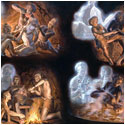 There was once a village that was plagued with constant theft. The villagers were unable to detect the thief in spite of all efforts. Whenever the people were alerted, the thief would run away. A hue and cry would be raised by the people, and the villagers gathered only to be disappointed.
There was once a village that was plagued with constant theft. The villagers were unable to detect the thief in spite of all efforts. Whenever the people were alerted, the thief would run away. A hue and cry would be raised by the people, and the villagers gathered only to be disappointed.
Finally, the headman in the village called for all the victims of the theft individually and questioned them in confidence. Upon a through inquiry, he discovered that one particular person was found to be present and anxious to find out the thief every time there had been a crime.
The village headman became suspicious at this coincidence. Therefore he devised a plan and advised the village guard to keep an eye on the suspected person at his house from midnight and report his movements. The headman himself was also carefully watching the guard and regularly supervised his duties.
One night the guard saw the suspect coming out of his house at about 2 o’clock, hiding a burglar’s tool for house-breaking under his shawl.
As the guard followed him, making sure that he was hidden from view, he observed the suspected man breaking through the wall of a villager’s house with the help of a burglar’s tool. After a while, the house owner started screaming, “Thief, thief!!”, and the guard watched as the suspected man came out of the house with the stolen goods and hurriedly entered into the nearby jungle.
When the villagers gathered as usual after the house owner started screaming for help, the suspected man came out of the opposite side of the jungle and innocently joined the crowd of villagers inquiring about the incident. He was just pretending to look for the thief and running up and down in all directions. Thus coming across the village guard patrolling nearby, he caught hold of him and started shouting, “Here is the burglar, here is the burglar!”
Attracted by his screaming, the people gathered around them and started jeering at the guard, taking him to be the burglar. Some of them were preparing to beat him.
Luckily, the village headman appeared on the spot and appeasing them, he took the guard to the side and asked him to give a complete report on the incident. He advised some other villagers to observe the reactions of the man who was the real culprit.
Thereafter, he proceeded towards the jungle as directed by the guard, along with other people, while the thief repeatedly asked them, “Why on earth are you going into the jungle for the burglar? On this dark night, that snake-infested jungle is most dangerous. No burglar can hide himself in there, for sure!”
When everyone was walking into the jungle, disregarding his constant grumbling, the man started gradually backing away with the idea of running off. It appeared from his face that he was greatly frightened.
Eventually, the jewellery box which the thief had taken from the villager’s house was found in the jungle along with the burglar’s tool. It was then crystal-clear to everyone present that the man complaining was the burglar himself, and so the crowd ran out of the jungle and started chasing him. As he was running away, they all shouted out, “There goes the thief. There goes the thief!”
The cunning thief also started shouting while running, “There goes the thief, there goes the thief,” and pointing to all the innocent passers-by, he got away by creating an utter confusion.
PURPORT
There is no dearth of such mischievous atheists among the people. They constantly malign the real protectors of the society who are like watchmen, and harass those great souls who are truly and selflessly benevolent to common people, only to tarnish their reputation by a vile attempt to prove those saintly persons as thieves and the like.
In all Vedic literature, Gita, Bhagavata, Upanisads etc., it has been specifically advocated that this material world belongs to the Supreme Lord, He is the proprietor of everything, and one who does not offer everything to the Supreme Lord for His satisfaction through preaching His glories and the holy name, simply devours His property for one’s own sense gratification, and as such, he is a thief.
Such a thief is always endeavouring to indicate that any person who is preaching the holy name of the Supreme Godhead, and going from door to door in order to wake everyone up from their illusory state of living, is only worthless, idle and a thief of social wealth. This is just like the motivated tendency of a thief who points to a sadhu as if he is running away from a burglary.
 A man made an unusual agreement with the God of Death. He told the God of Death that he would be willing to accompany him (as though he had a choice) only if God would send him a notice well in advance. The agreement was made.
A man made an unusual agreement with the God of Death. He told the God of Death that he would be willing to accompany him (as though he had a choice) only if God would send him a notice well in advance. The agreement was made.


